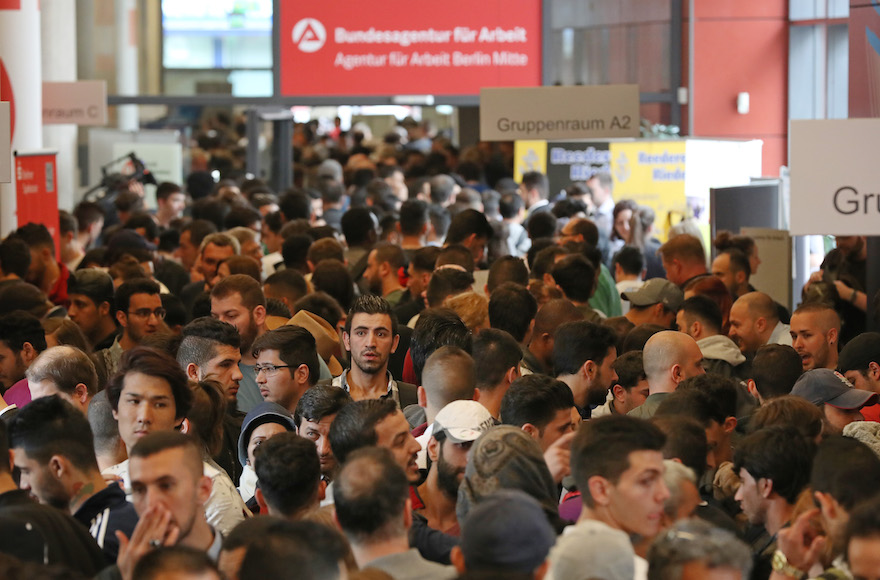BERLIN (JTA) — Anti-Semitism among Muslim refugees is rampant and requires urgent attention, a new study suggests.
But the study commissioned by the American Jewish Committee’s Ramer Institute for German-Jewish Relations in Berlin also suggests that refugees from persecuted minority communities are more likely to take a stand against anti-Semitism and for Israel.
Titled “Attitudes of refugees from Syria and Iraq towards integration, identity, Jews and the Shoah,” the research report was prepared by historian and sociologist Günther Jikeli of Indiana University and the University of Potsdam, Germany, with help from Lars Breuer and Matthias Becker. The study was commissioned by the American Jewish Committee.
The report, based on interviews with 68 refugees, comes amid a series of virulent anti-Israel and anti-America demonstrations in the German capital denouncing the U.S. recognition of Jerusalem as Israel’s capital. Thousands of protesters burned homemade Israeli flags and crowded city subway stations chanting anti-Israel and anti-American slogans on their way to rallies. The numbers of refugees among the demonstrators was unknown.
At the same time, in a show of solidarity with Jewish communities in Germany, local imams joined with Christian and Jewish leaders in public celebrations of Hanukkah, including the annual candle-lighting ceremony at the Brandenburg Gate, where Rabbi Yehuda Teichtal of Berlin was joined in a cherry picker by Mayor Michael Mueller. Security has been tightened throughout Germany and at Jewish venues.
The tensions run deep, the new study indicates. Anti-Semitic attitudes and rejection of Israel are widespread among the newcomers, the head of the Ramer Institute, Deidre Berger, said in a statement.
While many of those interviewed had positive impressions of Germany, they also tended to believe in conspiracy theories, such as about Jews or Israel controlling the world.
“Anti-Semitic thinking and stereotyping are very common … even among those who emphasize that they ‘respect’ Judaism or that there is no problem living together between Muslims, Christians and Jews in their countries of origin and in Germany,” Jikeli said in a statement.
Berger said that given the depth of anti-Jewish hostility in Arab countries, this is not surprising based on the stereotypes that are implanted in schools, mosques and government propaganda in some countries.
“[N]onetheless,” she said, “the dimensions of the problem are much larger than expected.”
“When political challenges multiply, anti-Semitism often increases, a situation that must not be tolerated,” Berger said, calling for swift prosecution of crimes related to hate and incitement.
She said integration classes for refugees must emphasize Germany’s links to Israel, support for Jewish communities in the country and liberal democratic values, adding that staff and volunteers must be trained to cope with anti-Semitic attitudes.
The study was funded by the Bennet Fund and the Meyer Fund.
At least 1 million Muslim refugees have arrived in Germany since the summer of 2015.
JTA has documented Jewish history in real-time for over a century. Keep our journalism strong by joining us in supporting independent, award-winning reporting.






